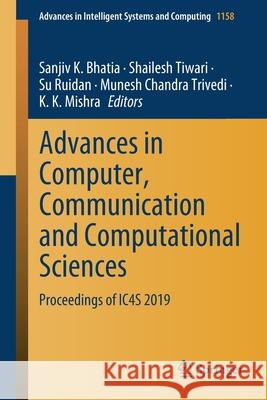Advances in Computer, Communication and Computational Sciences: Proceedings of Ic4s 2019 » książka
topmenu
Advances in Computer, Communication and Computational Sciences: Proceedings of Ic4s 2019
ISBN-13: 9789811544088 / Angielski / Miękka / 2020 / 1047 str.
Kategorie:
Kategorie BISAC:
Wydawca:
Springer
Seria wydawnicza:
Język:
Angielski
ISBN-13:
9789811544088
Rok wydania:
2020
Wydanie:
2021
Numer serii:
000453356
Ilość stron:
1047
Waga:
1.45 kg
Wymiary:
23.39 x 15.6 x 5.31
Oprawa:
Miękka
Wolumenów:
01
Dodatkowe informacje:
Wydanie ilustrowane











